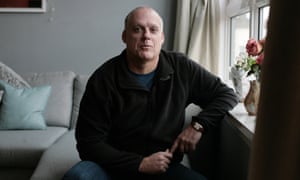Why has serial offender Terry Ellis swapped a life of crime to go straight?
A stint at the UK’s only therapeutic prison, Grendon,
put this criminal in touch with his feelings.
It’s allowed him to set up a business to help others leaving jail
put this criminal in touch with his feelings.
It’s allowed him to set up a business to help others leaving jail

On
release from Spring Hill prison last January, Terry Ellis was given a
small blue tent to live in. “They actually said, as long as you give us
the postcode of the bench you’re going to stay on tonight, that’s all
your probation officer needs.”
It was the third time Ellis had been behind bars. After serving eight
and a half years of a 16-year sentence for robbery, at the age of 53
Ellis had spent half his adult life in prison, and understood as well as
anyone the revolving door of homelessness, joblessness and incarceration.
“Survival kicks in. You’re going to go back to the thing you know.
You’re going to go back to selling drugs, you’re going to go back to
breaking into gaffs.”
But
this time the old ways haven’t kicked in for him. Instead he is
establishing a social enterprise which he hopes will generate funds to
provide other ex-cons leaving prison with a rent deposit scheme instead
of a tent.
Ellis is extraordinarily open, articulate and warm – unexpected
qualities, perhaps, in a career criminal, but ones he puts down to a
life-changing decision he made early in his last sentence. “My social
skills were pretty, you know, criminal. So it was always about ego,
bravado, the way you looked. Back in the day you had your role models.
My dad was an armed robber, and did life. These guys were my idols. I
met three robbers in prison the first time I was in, when they were all
in their 30s and 40s. And then I went in this time, and met them again
in their 60s and 70s. And they’re never getting out. And I was sitting
there and I thought, ‘I’ve really got to change this’.” So he applied to
Grendon.
HMP Grendon,
in Buckinghamshire, is the only prison in the UK run entirely as a
democratic therapeutic community. The prison houses 238 prisoners, who
undergo a rigorous programme of daily group therapy, and who in turn
each share responsibility for making decisions about the running of the
prison. Underpinned by a commitment to democratic values and community
ethos, the therapeutic community approach focuses on interpersonal
relationships and regulating emotions such as anger.
“They break you down. There is a lot of crying; there is a lot of
soul-searching. All the stuff that you’ve been normalising since you
were a kid.”
The results are remarkable.
Rates of recidivism for those who stay longer than 18 months are
significantly lower. Grendon inmates self-harm less than other
prisoners, and both offenders and staff report higher levels of
wellbeing. By every measure, Grendon is a success story.
And yet, in the rest of the prison system it has a reputation for
being, as Ellis puts it, “full of rapists, paedophiles, nonces”. When he
requested a transfer to Grendon, “Everyone thought I was crazy”.
I’d never talked to people before who had killed their kids, or to
rapists or paedophiles. And all of a sudden I was in that environment,
and I had to engage. You learn how to talk to people about things that
you never really speak about. When you’re a criminal you’ve got your
guard up. But in Grendon, you learn how to say things you genuinely
feel.”
Ellis spent more than two years there. “When I left, I don’t think I realised how much I’d actually learned.”
Ellis’s transformation is instructive at a time when the justice system is quietly imploding.
A slew of “transforming rehabilitation” reforms between 2014 and 2016
have privatised much of the resettlement and probation systems: a new
private sector of community rehabilitation companies (CRCs) now
supervise the majority of those leaving prison, often with negligible impact on reducing reoffending rates.
At the same time, the government is planning to invest £1.3bn to build up to 10,000 new adult prison places over the next four years, despite prison staff shortages. Ellis spent the last portion of his sentence in HMP Spring Hill,
a resettlement prison next door to Grendon designed to help prisoners
arrange housing and work for after release. “From the minute I got there
I was asking, ‘what’s the housing situation like?’” He says the CRC is
supposed to rehouse people, or get them somewhere to live, but a
shortage of suitable housing or private landlords willing to rent to
ex-offenders makes this impossible.
Ellis is now living in the spare room of an ex-girlfriend and
working on Sealing Futures, a social enterprise he plans to fund by
marketing an environmentally friendly reusable envelope.
“Business-to-business use about 850,000 envelopes a day. If they used
the Resendvelope, you could potentially cut down on 193m envelopes a
year. It’s a simple concept. We want to get the London mayor, Sadiq
Khan, interested, and colleges and councils interested.”
The
Resendvelope was designed by Ellis’s friend Darryl, who has bipolar
disorder and is still serving the last 12 months of his sentence. “We’re
hoping that if we can get this off the ground in the next 12 months, we
can get him a rent deposit so that he has somewhere to live when he
gets out. Because unless you’ve got somewhere to live, you’ve got no
respect, you’ve got no security.”
Curriculum vitae
Age: 53.
Family: Three daughters, two sons.
Lives: Camden, north London.
Education: Sir William Collins school, Camden.
Career: 2017-present: director, Sealing Futures
social enterprise; 2017-present: running educational workshops steering
young people away from crime; 1981-2009: career criminal (with three
stints in prison).
Interests: Bike riding, gym, yoga, long walks, helping out at the local food bank, and a new life at church.
BHP

